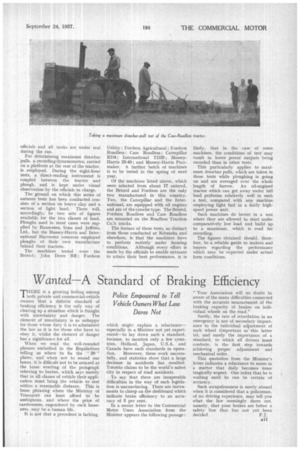Wanted A Standard of Braking Efficiency
Page 51

If you've noticed an error in this article please click here to report it so we can fix it.
Police Empowered to Tell Vehicle Owners What Law Dares Not
'THERE is a growing feeling among I both private and commercial-vehicle owners that a definite standard of braking efficiency is the only way of clearing up a situation which is fraught with uncertainty and danger. The element of uncertainty is as unhappy for those whose duty it is to administer the law as it is for those who have to obey it, whilst the element of danger has a significance for all.
• When we read the well-rounded phrases embodied in the Regulations telling us where to fix the " 20 " plates, and when not to sound our horns, it is difficult not to be amazed at the loose wording of the paragraph referring to brakes, which says merely that in all classes of vehicle their application must bring the vehicle to rest within a reasonable distance. This is loose phrasing where the Ministry of Transport can least afford to be ambiguous, and where the price of carelessness, engendered by such looseness, may be a human life.
It is not that a precedent is lacking, which might explain a reluctance— especially in a Minister not yet experienced—to lay down such a standard, because, to mention only a few countries, Holland, Japan, U.S.A. and Canada have such standards in opera
tion. Moreover, these work successfully, and statistics show that a large decrease in accidents has resulted. Toronto claims to be the world's safest city in respect of road accidents.
To say that there are insuperable difficulties in the way of such legislation is unconvincing. There are instruments to clamp on the dashboard which indicate brake efficiency to an accuracy of 5 per cent.
In a recent letter to the Commercial Motor Users Association from the Minister appears the following passage : Your Association will no doubt be aware of the many difficulties connected with the accurate measurement of the braking capacity of brakes on individual wheels on the road."
Surely, the rate of retardation in an emergency is not of secondary importance to the individual adjustment of each wheel (important as this latter is), and surely the importance of a standard, to which all drivers must conform, is the first step towards achieving proper adjustment and mechanical order, .
This quotation from the Minister's letter indicates a reluctance to move in a matter that daily becomes more tragically urgent. One infers that he is waiting until he can be certain of accuracy.
Such scrupulousness is surely absurd when it is considered that a policeman, of no driving experience, may tell you what the law seemingly dares not, namely, that your brakes are below a safety line that has not yet been decided. F.J.




























































































